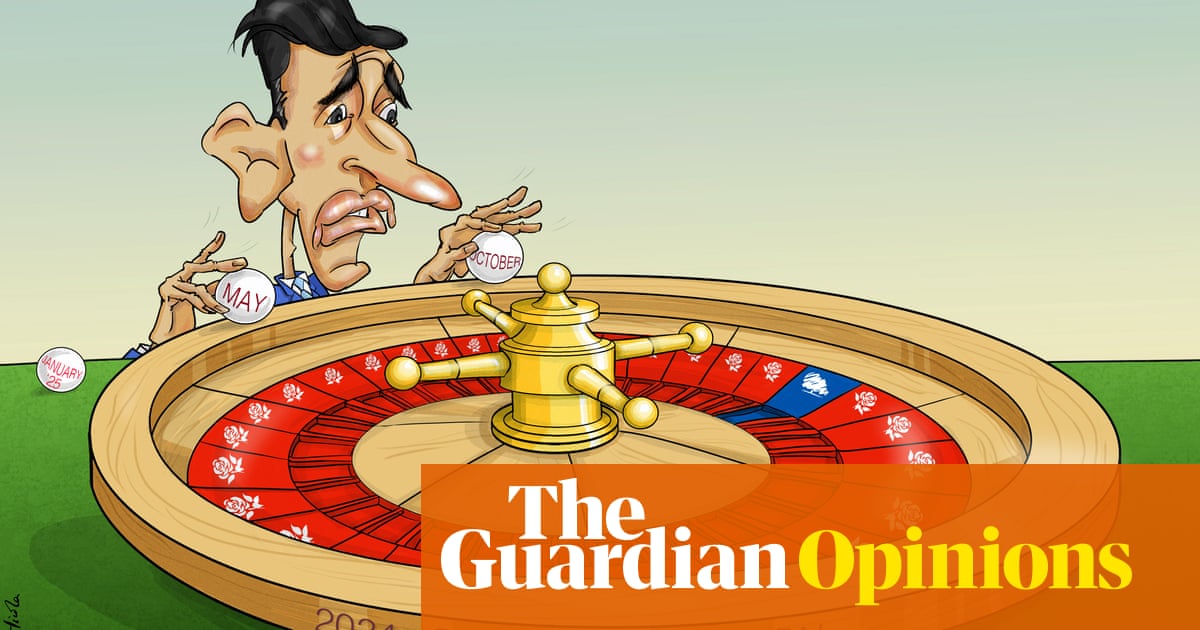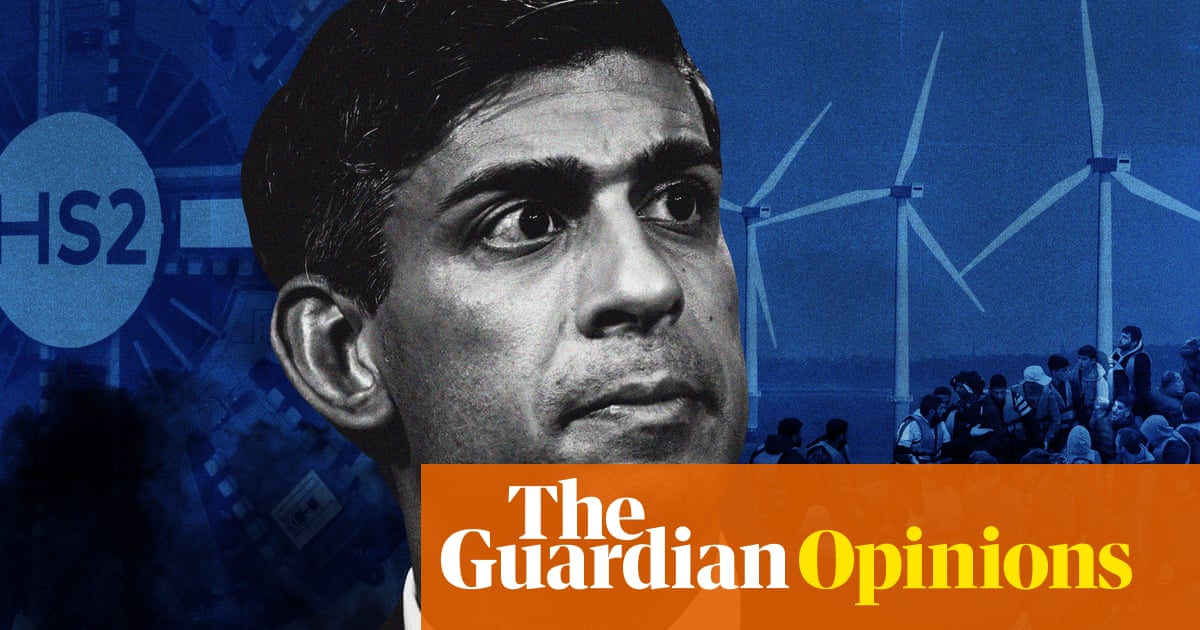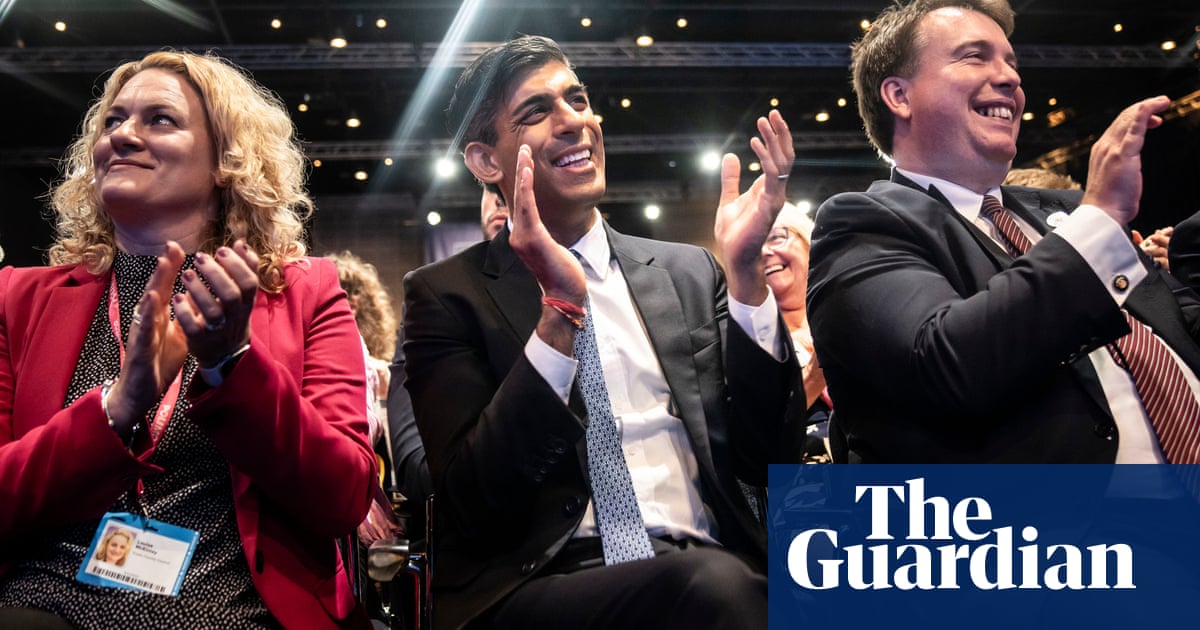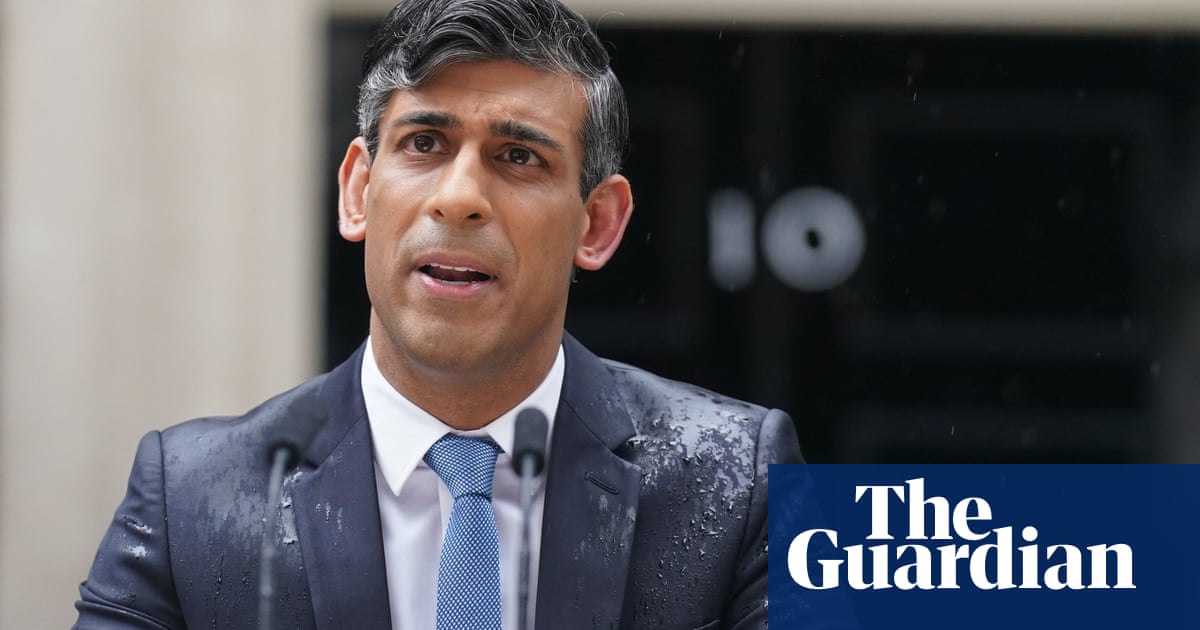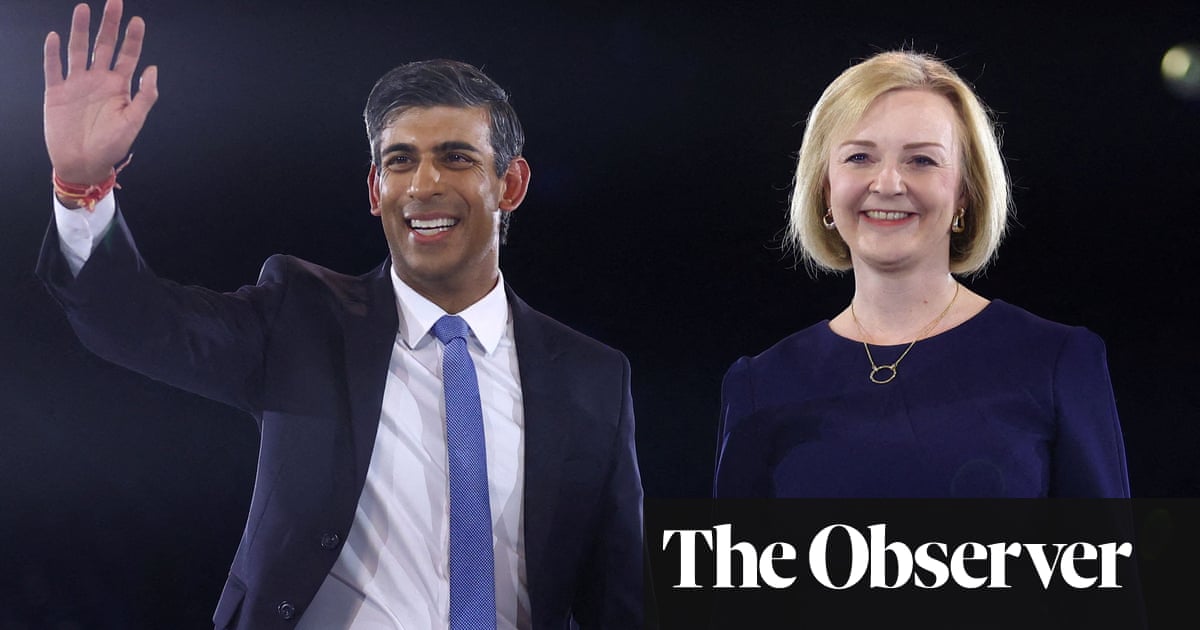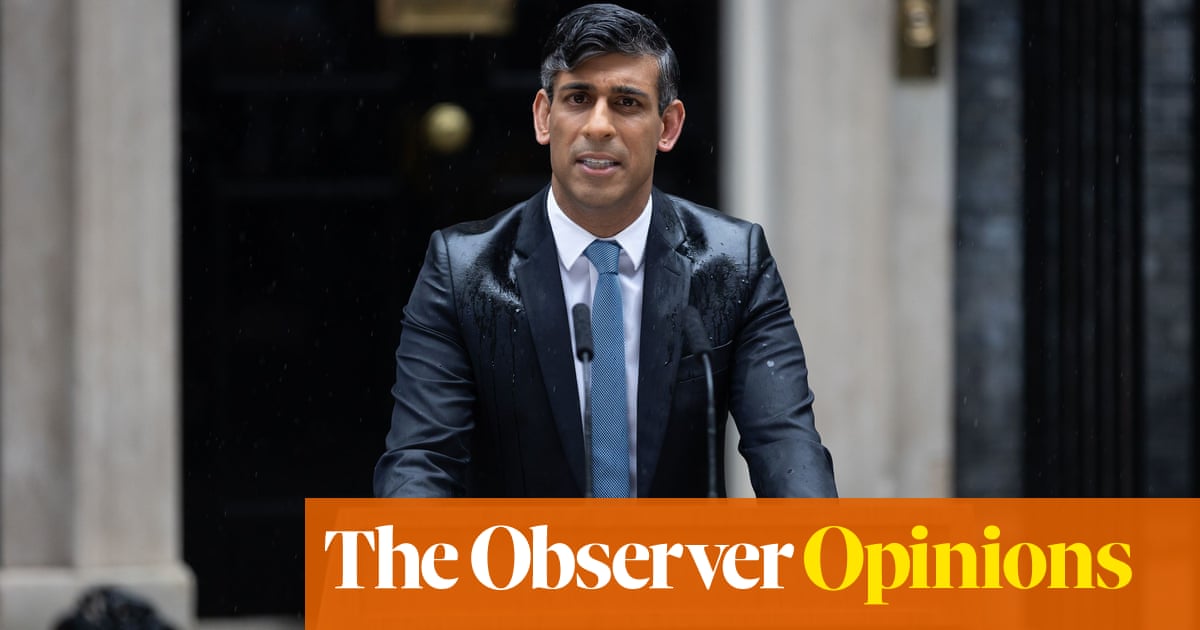
The defining image of the last general election was Boris Johnson driving a digger emblazoned with “Get Brexit Done” through a fake wall made of polystyrene bricks. This proved to be a presentiment that he was about to demolish a load of Labour seats before going on to do the same to standards in public life.
Rishi Sunak made an early bid to provide the enduring visual metaphor of campaign 2024 when he presented his hunched and drenched back to the cameras after making his announcement on Downing Street. I have never seen, and I’ve witnessed quite a lot of them, a prime minister launch their appeal for re-election in such a dismal fashion. Even incumbents who know in their bones that they are fated to lose usually manage to invest the moment with some authority and dignity. Mr Sunak resembled a drowned ferret during a speech that was rendered near inaudible because he proved unequal to the fight with pelting rain and a protester’s boom box blasting out New Labour’s 1997 victory anthem. Every wag at Westminster chortled: “Things can only get wetter”. If your central electoral pitch is that you are the man with a plan, best to have someone on your staff who knows how to erect a covering or hold an umbrella.
Within minutes, Labour had fired out Sir Keir Starmer’s well-crafted response. He went for the prime ministerial look by highlighting his party’s themes – end Tory chaos, time for a change, start to rebuild Britain – from a wood-pannelled room adorned with union jacks. Team Labour hugged themselves with glee at the winning contrast between their guy and the bedraggled Tory leader. If that is a harbinger of what is going to unfold over the next six weeks, this campaign is going to be an extremely unequal fight between a hungry and well-oiled red machine and a demoralised and shambolic blue outfit.
The contest begins with the Tories languishing behind Labour by 20 points or so in the poll of polls. No governing party has ever started that far behind and gone on to win. They’ll be hoping to shrink the gap between incumbent and challenger, and often this does happen, as the country gets closer to making its choice. The more optimistic Conservative strategists take encouragement from analysis of the May local elections, which suggests Labour’s true advantage is not as enormous as that suggested by headline polling. They should not clutch too tightly to that straw. Sir Keir can see half his poll lead vanish and still be confident that efficient distribution of Labour support will propel him into Number 10 with a very good majority.
Were Mr Sunak to somehow contrive to keep his party in office, he will be hailed as the comeback magician of all time. In the rather more probable event that the Tories are going to spend 5 July crawling through the ruins of a heavy defeat, people are going to say that it was lunacy to call a summer election when he didn’t have to. It is hard to identify anyone in his party who believes Mr Sunak to be capable of a miracle while it is easy to find people who think he has committed an act of madness. Phrases such as “death wish” and “off his head” trip from the lips of Tories. A leader wants to go into a campaign with his side cheering him on, not a chorus of colleagues chuntering that he’s lost his marbles.
Most of Westminster, myself included, expected him to postpone the reckoning until he’d clocked up at least two years as prime minister. Morale on the Tory side was never likely to be high in any circumstances, but it has been further depressed by Mr Sunak springing the election on a party that thought the appointment with defeat would be delayed until later in the year. The Tory party reverberates with the furious question: why the hell did he do it? The full truth won’t emerge until we’ve seen the diaries and memoirs, but there are plausible explanations knocking around. The case for waiting until autumn or winter in order to offer pre-election sweeteners had become flaky, because the state of the public finances made it increasingly unlikely they’d be in position to do any tax cuts. The closer we got to winter, the more likely it was there would be more bad news about the sickly condition of the NHS, sharpening the salience of one of the Conservatives’ most acute areas of vulnerability. The Reform party, the menace to the Tories on their right flank, isn’t fully election-ready now, but may have been had he waited. Added to which was the further damage that would be inflicted on Mr Sunak’s credibility by more and more small boats crossing the Channel as the weather got sunnier. Going now is an admission that things weren’t going to get brighter and may very well have been made even darker by clinging on. “He thought: why prolong the agony?” says one cabinet member.
There are credible accounts that Mr Sunak has become increasingly querulous with aides and colleagues over the past few months as nothing he has tried has moved the dial. He’s looked like a man trapped by diminishing time, undermined by mutinous colleagues and almost totally ignored by the voters. Not the master of his own fate. By choosing to go earlier than anticipated, he played the last card in his hand to take the initiative and command events, albeit only fleetingly. I am also quite persuaded by those who say that it was a fit of despairing anger by someone who can no longer bear doing the job. Living under a decomposing regime is not a pleasant experience for those being ruled by it. Presiding over one must be miserable as well. It turns out that the prime minister was among those yearning to escape the purgatory of zombie government.
Whatever the blend of his motivations, the decision has dumbfounded and dismayed many more Tories than it has delighted. Some cabinet ministers openly spoke out against it at their meeting before he went out on to Downing Street. Other senior ministers seethed in silence, seeing no point in objecting when the prime minister had already done the deed by making a clandestine visit to the king. The Tory leader ignored advice to wait from the party’s chief election strategist, Isaac Levido. Labour was taken by surprise, but the party Mr Sunak has most wrongfooted is his own. The Tories still lack a candidate in many seats, even some battleground ones.
When it ought to be all hands to the pumps for their party, Michael Gove and other high-profile Tories are making like rats and scuttling from the listing ship. This does not add up to a recipe for a confident and united Conservative effort. The second full day of campaigning involved a prime ministerial visit to Belfast’s Titanic Quarter, deepening suspicions that a Labour mole is organising his schedule. I think it not beyond the realms of possibility that the Tories will simply unravel under the pressure of waging a battle that looks so unwinnable. That is essentially what happened to John Major’s Conservatives when they plunged into a doom spiral on their way to the landslide defeat of 1997.
Now, as then, they are up against a Labour party whose attack lines are well-practised, whose defences look well-prepared, whose discipline is honed, whose mood is buoyant and whose people are ravenous for power after a protracted stretch in the wilderness of opposition. For sure, the campaign will be a searching stress test for Sir Keir and subject his party to intense scrutiny. Some kind of Labour wobble is likely along the way, but it is going to take an earthquake to shake expectations. There’s a risk for Labour in the universality of the assumption that the result of this election is already decided before a single vote has been cast. I do not mean that the shadow cabinet will behave as if victory is in the bag. Losing four elections in a row concentrates the mind, and Sir Keir is as fiercely anti-complacency as Tony Blair was in ’97. The source of danger for Labour is that it will underperform if soft supporters don’t see an imperative to turn out or feel free to back other parties in constituencies where that may hand the seat to a Conservative candidate. This spectre is already troubling members of the shadow cabinet.
In one respect, both the Tory and Labour leaders have a common interest. Neither will want the outcome of this election to be seen as a foregone conclusion, even if both sense that it is.
Andrew Rawnsley is the Chief Political Commentator of the Observer





